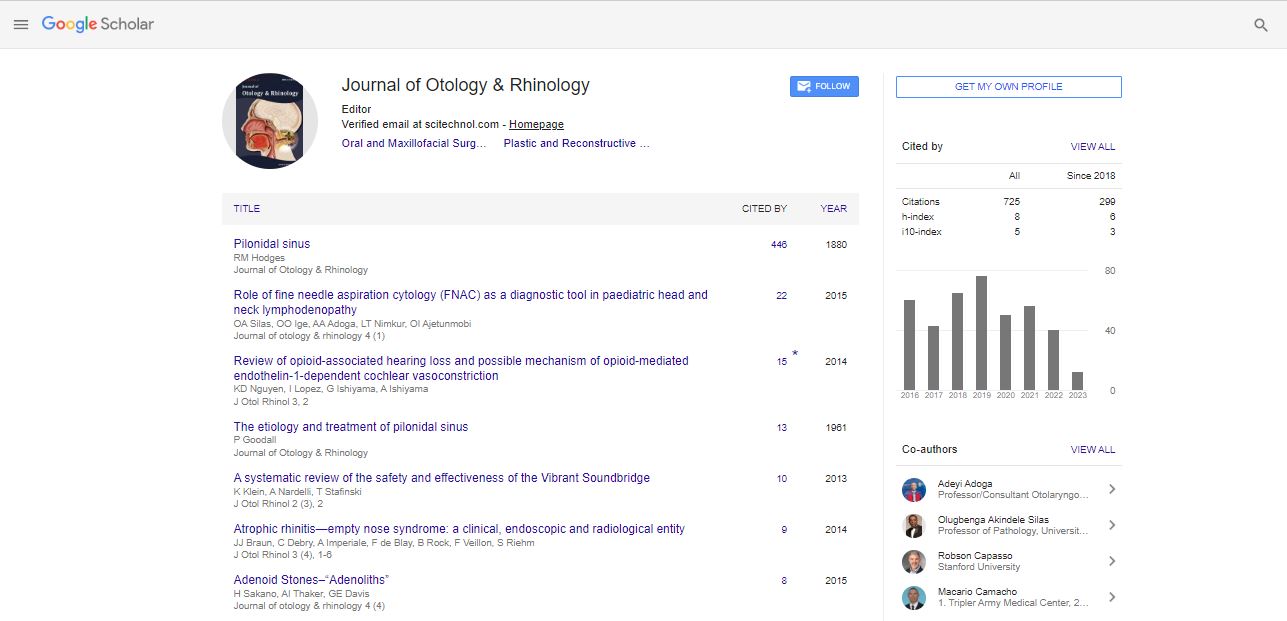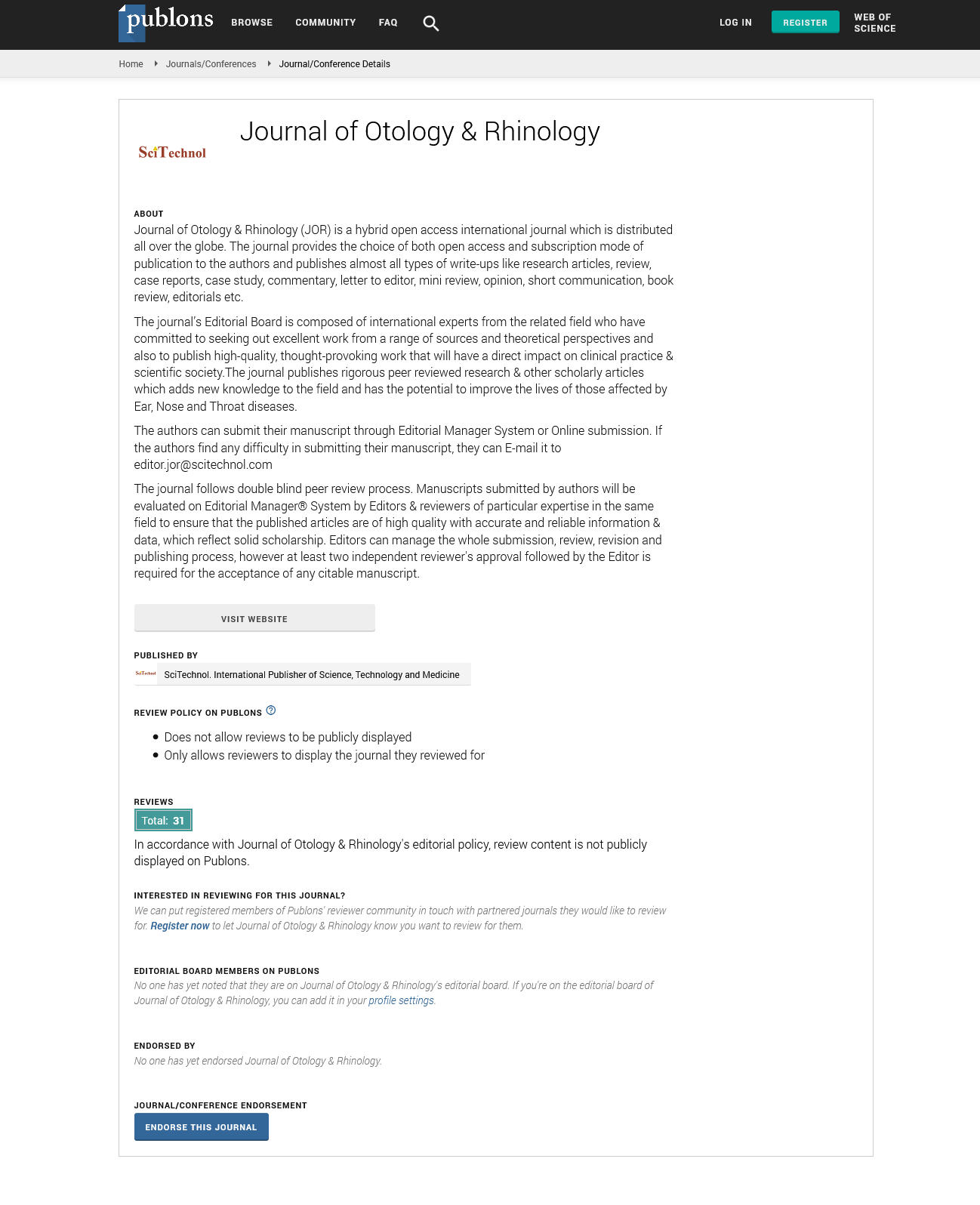Short Communication, J Otol Rhinol Vol: 12 Issue: 3
Exploring Xerostomia and Its Implications
Stuart Beitler*
1Department of Surgical Sciences, University of Oxford, Oxford, UK
*Corresponding Author: Stuart Beitler,
Department of Surgical Sciences,
University of Oxford, Oxford, UK
E-mail: beitlerstuart@gmail.com
Received date: 21 April, 2023, Manuscript No. JOR-23-102359;
Editor assigned date: 24 April, 2023, PreQC No. JOR-23-102359 (PQ);
Reviewed date: 08 May, 2023, QC No. JOR-23-102359;
Revised date: 15 May, 2023, Manuscript No. JOR-23-102359 (R);
Published date: 22 May, 2023, DOI: 10.4172/2324-8785.100063
Citation: Beitler S (2023) Exploring Xerostomia and Its Implications. J Otol Rhinol 12:3.
Description
Xerostomia, commonly known as dry mouth, is a condition characterized by a decreased production of saliva in the mouth [1]. Saliva plays a crucial role in maintaining oral health and overall wellbeing. It helps with digestion, facilitates speech, protects the teeth from decay, and prevents infections in the mouth [2]. When the salivary glands fail to produce sufficient saliva, it can lead to various complications and discomfort for individuals affected by xerostomia.
Causes and complications of xerostomia
There are numerous causes of xerostomia. One common cause is medication, as certain drugs can interfere with the normal functioning of the salivary glands [3]. Medications such as antihistamines, decongestants, antidepressants, and diuretics are known to have this side effect. Other medical conditions can also contribute to dry mouth, including autoimmune disorders like Sjögren's syndrome, diabetes, HIV/AIDS, Parkinson's disease, and stroke [4]. Additionally, radiation therapy or chemotherapy for cancer treatment can damage the salivary glands, resulting in xerostomia.
The symptoms of xerostomia can vary from mild to severe and can have a significant impact on a person's quality of life [5]. Common symptoms include a persistent dry sensation in the mouth, thick or stringy saliva, difficulty chewing, swallowing, or speaking, a burning or tingling sensation in the mouth, cracked lips, mouth sores, bad breath, and an increased susceptibility to dental cavities and gum disease.
The consequences of xerostomia extend beyond oral discomfort. Without adequate saliva, the mouth becomes an environment favorable for bacterial growth, which can lead to an increased risk of dental caries (cavities), gum disease, and oral infections [6]. Saliva also contains enzymes that aid in the digestion of food, so individuals with xerostomia may experience difficulties with chewing and swallowing, leading to nutritional deficiencies. Furthermore, the lack of saliva can affect speech, taste perception, and the ability to wear dentures comfortably.
Managing and alleviating of xerostomia
Managing xerostomia involves addressing the underlying cause, if possible, and implementing strategies to alleviate symptoms [7]. If medication is the cause, adjusting the dosage or switching to an alternative medication may help. In cases where the salivary glands are damaged, treatment options include artificial saliva substitutes, medications that stimulate saliva production, and lifestyle changes to promote oral health.
Maintaining good oral hygiene is crucial for individuals with xerostomia. Regular dental check-ups and cleanings are essential to prevent tooth decay and gum disease [8]. Dentists may recommend the use of fluoride toothpaste, mouth rinses, and dental gels to protect the teeth from cavities. Sipping water frequently and chewing sugar-free gum or sucking on sugar-free candies can help stimulate saliva flow. Avoiding tobacco, alcohol, and caffeine, which can further dry the mouth, is also advised.
In addition to these measures, there are various home remedies and self-care techniques that individuals with xerostomia can try [9]. These include avoiding spicy or salty foods that can irritate the mouth, using a humidifier in the bedroom to add moisture to the air, practicing good oral hygiene habits such as brushing with a soft toothbrush and flossing gently, and staying adequately hydrated by drinking water throughout the day.
It's important for individuals with xerostomia to be proactive in managing their condition and seeking professional help when needed [10]. Dentists, primary care physicians, and specialists such as oral medicine specialists or oral and maxillofacial surgeons can provide guidance and treatment options tailored to each individual's specific needs. Xerostomia is a condition that can cause significant discomfort and oral health issues. Understanding the causes, symptoms, and available treatment options is crucial for individuals affected by this condition.
References
- Baer AN, Walitt B (2018) Update on Sjögren syndrome and other causes of Sicca in older adults. Rheum Dis Clin North Am 44(3): 419-436.
[Crossref] [Google Scholar] [Indexed]
- Närhi TO (1994) Prevalence of subjective feelings of dry mouth in the elderly. J Dent Res 73(1): 20-25.
[Crossref] [Google Scholar] [Indexed]
- Schein OD, Muñoz B, Tielsch JM, Bandeen-Roche K, West S (1997) Prevalence of dry eye among the elderly. Am J Ophthalmol 124(6): 723-728.
[Crossref] [Google Scholar] [Indexed]
- Craig JP, Nichols KK, Akpek EK, Caffery B, Dua HS, et al. (2017) TFOS DEWS II definition and classification report. Ocul Surf 15(3): 276-283.
[Crossref] [Google Scholar] [Indexed]
- Bartlett JD, Keith MS, Sudharshan L, Snedecor SJ (2015) Associations between signs and symptoms of dry eye disease: A systematic review. Clin Ophthalmol 9: 1719-1730.
[Crossref] [Google Scholar] [Indexed]
- Turner MD (2016) Hyposalivation and Xerostomia: Etiology, complications, and medical management. Dent Clin North Am 60(2): 435-443.
[Crossref] [Google Scholar] [Indexed]
- Barbe AG (2018) Medication-induced xerostomia and hyposalivation in the elderly: Culprits, complications, and management. Drugs Aging 35(10): 877-885.
[Crossref] [Google Scholar] [Indexed]
- Saleh J, Figueiredo MA, Cherubini K, Salum FG (2015) Salivary hypofunction: An update on aetiology, diagnosis and therapeutics. Arch Oral Biol 60(2): 242-255.
[Crossref] [Google Scholar] [Indexed]
- Jensen JL, Bergem HO, Gilboe IM, Husby G, Axéll T (1999) Oral and ocular sicca symptoms and findings are prevalent in systemic lupus erythematosus. J Oral Pathol Med 28(7): 317-322.
[Crossref] [Google Scholar] [Indexed]
- Wong J, Lan W, Ong LM, Tong L (2011) Non-hormonal systemic medications and dry eye. Ocul Surf 9(4): 212-226.
[Crossref] [Google Scholar] [Indexed]
 Spanish
Spanish  Chinese
Chinese  Russian
Russian  German
German  French
French  Japanese
Japanese  Portuguese
Portuguese  Hindi
Hindi 


